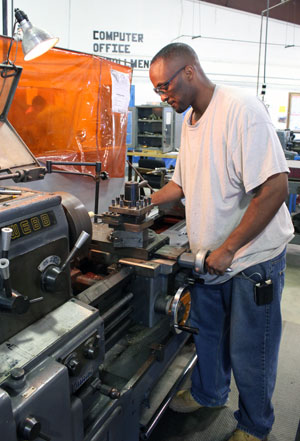
Comment from a Former Convict: ‘Give Me a Chance’
-
Joe Wertz

Joe Wertz / StateImpact Oklahoma
An inmate works a lathe at the machine shop in the Skills Center at McLeod Correctional Center near Atoka, Okla.
Oklahoma imprisons more people per-capita than almost every other state in the nation. We lead the pack when it comes to incarcerating women, and the state spends a lot of taxpayer money on prisons — more than state cops and courts combined.
About 8,000 people leave state prisons every year, and a big part of re-entering society is finding a job. It’s a struggle for most, and StateImpact Oklahoma has been documenting the challenges and the state’s role.
Our coverage has struck a chord with readers, including some who’ve been to prison:
“I’m just trying to start my life over but these employers are scared,” writes commenter Christopher, a felon from Arkoma in eastern Oklahoma.
Reader Richard Whetsell worries that felons leave prison in worse shape than when they entered.
“How can we as a culture be so ignorant as to believe that locking someone up for five years will somehow miraculously change them into model citizens,” he asks, commenting on “Locked Up But Looking Ahead: Employment After Prison in Oklahoma.”
Felons face myriad employment obstacles when they’re released from state prisons. Some are obvious, others are less so. When Michael Howell-El was released after a 23-year drug-related sentence, what little money he’d accrued while working in prison was wiped out by fees, fines and child support payments. Former inmates also face housing issues and difficulty getting drivers licenses reinstated, a requirement for many jobs.
It’s a costly post-incarceration catch-22: It’s hard to find, get and keep a job without a home or drivers license — but how do you pay for housing and reinstatement fees without a job?
Oklahoma statutes restrict felons from being certified for professional licenses and certifications. Some make clear sense, like preventing felons from carrying firearms or working as a bank officer. But what about cosmetology and funeral directors?
Keeping felons from working at funeral homes makes sense, says Reece Dudley of Del City, commenting on “Daunting Employment Barriers Await Oklahoma Felons After Prison.”
“Maybe you can’t be an undertaker if (you’re) a felon, because you have access to massive amounts of hazardous chemicals that are often used in illegal drugs,” Dudley says on Facebook.
Criminologists and Oklahoma corrections officials say giving felons career training reduces recidivism and saves the state money.
Inmates at the McLeod Correctional Center near Atoka receive vocational education at a state Skills Center. Inmates there leave as certified welders, machinists and heavy equipment operators, which helps them find jobs. They also practice their skills repairing prison equipment. When StateImpact visited, an inmate was using a lathe to machine a new part for a state-owned trailer.
Commenter Mary has an idea: Why aren’t select prisoners trained in plumbing, welding and electrical work — and charged with maintenance work at other prisons and state facilities?
“It sounds like a win-win situation,” she writes. “Give him a fish, or teach him to fish…”
